The Clockmakers Son

Wahhabis
are divided into different
Salafi Sects
are divided into different
Salafi Sects
Madhkhalee, Qutubis and
Jihadists ...etc

The Wahhabis who are blind supporters of Kingdom of Saudi Arabia's illegitimate rule and its policies are called:
The Madhkhalees

^They do not want to talk about any changes in Saudi Kingdom. They support all policies of Saudi Kingdom like their support to the USA, inviting the US Army in the past to attack Iraq. In short, they are blind supporters of Saudi Government and use personal interpretation of Quranic verses and hadith to prove their point.They follow a Scholar called Raabee ibn Haadee Al-Maadkhaalee.
The Qutbis

^ Are the Wahhabis who want a change in Kingdom of Saudi Arabia and use a Qauranic verse( Anyone who rules by other than what Allah has revealed) to call all rulers of Saudi Arabia as Kafir. The "Qutubi Salafi" faction who like Syed Qutb, who to my knowledge was an Islamic activist who was executed by theEgyptian Govt.
The Salafi Jihadist
2014
Evil ISIS
There are many branches of
Wahhabi Evil
Wahhabi Evil
Salafi Talafis, Pathless, Ikhwan
Madkali Salafis, Saudi Salafis, Jihadi Salafis, Qutubis, Sururis,
Modernist Salafis, Murji ,etc, etc, etc: Here
Madkali Salafis, Saudi Salafis, Jihadi Salafis, Qutubis, Sururis,
Modernist Salafis, Murji ,etc, etc, etc: Here
---
Wahhabiyyah Admirers
The Ahle Hadis:

Not to forget their
Sisters
Sisters

The Deobandis
which are of Two Twins:
which are of Two Twins:
^ Hayati and Mamati
Hold on...they also have a young brother called:
The Tableeghi Jamaat

---
I know what you are thinking!

---
Their Admirers
Munāfiq Hypocrite
Gustakh e Rasool
--
*They we’re in the habit of insulting and degrading the dignity of Allah’s Beloved Messenger (Sallallahu Alayhi Wasallam).
*They considered the Prophet (Sallallahu Alayhi Wasallam) as an ordinary man like themselves and that he was completely powerless.
*They were strongly opposed to the intercession(Shafa’at) of the Holy Prophet (Sallallahu
Alayhi Wasallam).
*They out rightly rejected the Wasila (medium) of the Prophet (Sallallahu Alayhi Wasallam).
*They laughed and jeered at the Prophet’s (Sallallahu Alayhi Wasallam) knowledge of the
Unseen.
*They were in the habit of sitting amongst themselvesin groups in the Prophet’s (Sallallahu Alayhi Wasallam) Mosque, perpetually creating mischief anddisunity amongst the Believers.
[Here]
--
The Elders (akabir) of the Deobandiyyah Insulted the Holy Prophet(s) to promote evil wahhabi teachings...
Deobandiyyah/Wahhabiyyah Reject:
Prophet(s)Knowledge, Light(Nur),First Creation, Ya Muhammad,Wasila/Istighatha(Ya Ali Madad,Ya Shaykh...etc),Celebrating Mawlid(Milad)...etc...etc!
We will come back to the Deobandis/Tablighis later... for more Info:[Here]
---
Wahhabiyyah/salafi/ahlehadith
and their admirers
(Deobandiyyah/Tablighi's)
(Deobandiyyah/Tablighi's)
We do not show any preferences when the choice is between:
Cow Dung and Buffalo dung!
They all admire and highly praise ibn taymiyyah and ibn abdal wahhab najdi and follow their evil teachings: Mujassima (Anthropomorphist) ascribe Human attributes to Allah (SWT), they have the concept of Triple Tawheed (3=1) in Islam and these Wahhabiyyah Cults/sects blindly follow their recent scholarsand consider all other Muslims asMushrik/Bid'atis upon Shirk!
===
NOW
The Clock Makers Son

Salafi Clock
On the first of October 1999
Sheikh Mu-hammed Nasir al-Din al-Albani


^...passed away at the age of 85
he was mourned by

virtually everyone in the world of Salafi Islam,
he represented its third main contemporary reference, after
‘Abd al-’Aziz bin Baz:
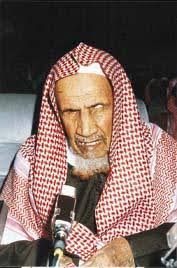
^who himself had died a few months before

&

^who would pass away in January 2001
leading figures of the Saudi ReligiousEstablishment.

---
The ClockMakers Son

"The Birth"

Salafi Newspapers, Journals, and Websites
celebrated this Syrian son of an Albanian clock-maker

Whose family left Albania in 1923, when he was nine years old, and re-established itself in Damascus—who had become known as the muhaddith al-’asr (traditionist of the era), that is, the greatest hadith scholar of his generation.
^How did al-Albani, with his undistinguished social and ethnic origins, come to occupy such a prestigious position in a field long monopolized by a religious elite from the Saudi region of Najd—The answer is, as we shall see through the example of al-Albani himself and some of his disciples, lies in his revolutionary approach to hadith.
The Wahhabi paradox
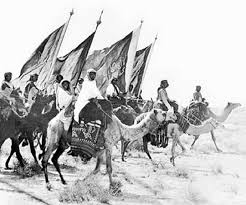
Common knowledge considers Shaykh Nasir al-Din al-Albani to be staunch proponent of Wahhabism, the discourse produced and upheld by the official Saudi religious establishment.This is undoubtedly true in terms of ‘aqidah (creed), yet al-Albani strongly disagrees with the Wahhabis—and especially with their chief representatives, the ulama of the Saudi religious establishment—when it comes to fiqh (law).
There, al-Albani points to a fundamental contradiction within the Wahhabi tradition: the latter’s proponents have advocated exclusive reliance on the Quran, the Sunna, and the consensus of al-salaf al-salih (the pious ancestors), yet they have almost exclusively relied on Hanbali jurisprudence for their fatwas—acting therefore as proponents of a particular school of jurisprudence, namely Hanbalism.
According to al-Albani, this also applies to Mu-hammad bin ‘Abd al-Wahhab whom he describes as “salafi in creed, but not in fiqh.”
For al-Albani, moreover, being a proper “salafi in fiqh” implies making hadith the central pillar of the juridical process, for hadith alone may provide answers to matters not found in the Quran without relying on the school of jurisprudence.

The mother of all religious sciences therefore becomes the “science of hadith,” which aims at re-evaluating the authenticity of known hadiths. According to al-Albani, hoever, independent reasoning must be excluded from the process: the critique of the matn (the content of the hadith) should be exclusively formal, i.e. grammatical or linguistic; only the sanad (the hadith’s chain of transmitters) may be properly put into question.
As a consequence, the central focus of the science of hadith becomes ‘ilm al-rijal (the science of men), also known as ‘ilm al-jarh wa-l-ta’dil (the science of critique and fair evaluation), which evaluates the morality—deemed equivalent to the reliability—of the transmitters. At the same time—and contrary to earlier practices—al-Albani insists that the scope of this re-evaluation must encompass all existing hadiths, even those included in the canonical collections of Bukhari and Muslim, some of which al-Albani went so far as to declare weak.
Al-Albani
CORRECTING
IMAM BUKHARI (RA)
-
Revolutionary interpretations
As a consequence of the peculiarirty of this method, al-Albani ended up pronouncing fatwas that ran counter to the wider Islamic consensus and more specifically to Hanbali/Wahhabi jurisprudence. For instance, he wrote a book in which he redefined the proper gestures and formulae that constitute the Muslim prayer ritual “according to the Prophet’s practice”—and contrary to the prescriptions of all established schools of jurisprudence.
As a consequence of the peculiarirty of this method, al-Albani ended up pronouncing fatwas that ran counter to the wider Islamic consensus and more specifically to Hanbali/Wahhabi jurisprudence. For instance, he wrote a book in which he redefined the proper gestures and formulae that constitute the Muslim prayer ritual “according to the Prophet’s practice”—and contrary to the prescriptions of all established schools of jurisprudence.
Also, he stated that mihrabs—the niche found in a mosques indicating the direction of Mecca were bid’a (an innovation)
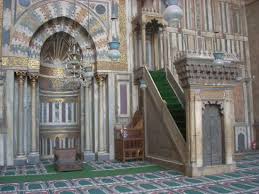
and declared licit to pray in a mosque with one’s shoes...etc

Palestinians to leave the occupied territories since, he claimed, they were unable to practice their faith there as they should—something which is much more important than a piece of land.
Nasir-al Bani, has issued a Fatawa stating that:
“The Intifada (Uprising) movement of the Palestinian Muslims is absolutely Haraam.” The Fatawa also said that:
“If the Palestinian Muslims did not stop the Intifada Movement and move out of the Israeli occupied land, then they would be classed as sinners.” (Minarul Huda, Vol.34)
Also not to forget his other fiddle:
Grand Mufti, Abdul Aziz bin Baaz had issued a Fatawa (Judicial Decree) stating that:
“It is absolutely Ja'iz (permissable) for Palestinians to reconcile with Israel without any prior conditional arrangements.” (Reported in the Arabic magazine "Minarul Huda", published in Beirut)
The presence of al-Albani in Saudi Arabia—where he was invited in 1961 by his good friend Shaykh ‘Abd al-’Aziz bin Baz to teach at the Islamic University of Medina—prompted embarrassed reactions from the core of the Wahhabi establishment, who disagreed with him but could hardly attack him because of his impeccable Wahhabi credentials in terms of creed.
The controversy sparked by his book The Veil of the Muslim Woman, in which he argued that Muslim women should not cover their face
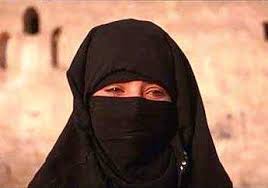
a position unacceptable by Saudi standards—, finally gave the Wahhabi establishment:

the justification needed to get him out of theKingdom in 1963.

He then re-established
himself in his country of birth, Syria, before leaving for Jordan in 1979.

However, the opposition al-Albani encountered from theWahhabi religious establishment was not merely intellectual:

By putting into question the methodological foundations upon which the Wahhabis had built their legitimacy, he was also challenging their position in the Saudi religious field.
From its inception, Wahhabism had established itself as a religious tradition—at the core of which laid a number of key books, both in creed and law. This tradition had been monopolized by a small religious aristocracy from Najd,first centered around Mu-hammad bin ‘Abd al-Wahhab and his descendants (known as the Al al-Shaykh)
before opening up to a small number of other families. In the Saudi system as it took shape, the members of aristocracy would become the only legitimate transmitters of the Wahhabi tradition; in this context independent scholars were excluded because they had not received“proper ‘ilm” from “qualified” ulama.
Traditional Wahhabi ‘ilm, therefore, was the fruit of a process of transmission and depended on the number ofijazas—a certificate:

by which a scholar acknowledges the transmission of his knowledge (or part of it) to one of his pupils, and authorizes him to transmit it further—given by respected Wahhabi scholars.
This is the very logic of al-Albani—who, himself, owned very few of these certificates—would challenge by promoting his critical approach. As a matter of fact, according to al-Albani, transmission has no importance whatsoever, because, every hadith being suspect, the fact that it was narrated by a respected scholar cannot guarantee its authenticity.
On the contrary, the important process of accumulation—a good scholar of hadith being someone who has memorized a large sum of hadith and, more importantly, the biographies of a large number of transmitters. Thus, the science of hadith can be measured according to the objective criteria unrelated to family, tribe, or regional descent, allowing for a previously absent measure of meritocracy.
More importantly, al-Albani claims of being more faithful to the spirit of Wahhabism than ‘Abd al-Wahhab himself made the former’s ideas very popular among Salafi youth:

Religious entrepreneurs
For all these reasons, al-Albani’s ideas would rapidly become a means for Salafi religious entrepreneurs from outside the Wahhabi aristocracy to challenge the existing hierarchy.

Al-Albani himself quickly gathered a large following, in Saudi Arabia and beyond. He would soon have to be recognized, despite the initial hostility of the Wahhabi religious establishment, as one of the leading figures inSalafism.
In the mid-1960s, a number of al-Albani’s disciples inMedina founded al-Jamaa al-Salafiyya al-Muhtasiba (The Salafi Group which Commands Good and Forbids Evil), aradical faction of which, led by Juhayman al-’Utaybi,would storm the grand mosque in Mecca in November 1979.

Many of the group’s members—and especially its scholars—were either of Bedouin descent or non-Saudi residents, and were thus marginalized in the religious field. Their activism came, in part at least, as a response to their marginalization.
One of the main religious figures of this group—who was “lucky” enough to have been thrown out of the Kingdom in 1978 and therefore did not take part in the 1979—was Muqbil al-Wadi’i, who subsequently re-established himself in his native Yemen and became the country’s most prominent Salafi scholar.
In the late 1980s, some of al-Albani’s pupils, led by Medinan shaykh called Rabi’ al-Madkhali, formed an informal religious network generally referred to as al-Jamiyya (”the Jamis”, named after one of their key members, Muhammad Aman al-Jami).
Beyond their focus on hadith, the Jamis became known as emphasizing al-Albani’s calls not to indulge in politics and for denouncing those who did. Again, many of the Jamis were peripheral origin (al-Madkhali was from Jazan, on the Yemeni border, while al-Jami was from Ethiopia) and had therefore been excluded from all leading positions in the religious field.
They would finally gain prominence in the early 1990s, when the Saudi government supported them financially and institutionally, in the hope of creating an apolitical ideological counterweight to the Islamist opposition led by the al-Sahwa al-Islamiyya (the Islamic Awakening), an informal religio-political movement which appeared in Saudi Arabia in the 1960s as the result of a hybridization between Wahhabism, on religious issues, and on the ideas of the Muslim Brotherhood, on political issues.
In the 1990s, a few students of al-Albani would go so far as to challenge both the Wahhabi religious aristocracy and al-Albani himself.
Following the teachings of an Indian shaykh called Hamza al-Milibari, they would promote the centrality of hadith, while criticizing al-Albani for relying, in his critique of hadith, on the methods used by late traditionists—at least so they claimed.
On the contrary, they would pride themselves for relying exclusively on the methodology of the early traditionists (that is those anterior to al-Dar Qutni (917-995)) and would therefore name their approach manhaj al-mutaqad-dimin (the methodology of the early ones).
Again, most of these scholars were peripheral figures, such as Sulayman al-’Alwan, a very young—al-’Alwan was born in 1970 and started to become known as a scholars while he was in his twenties—shaykh of non-tribal descent, and ‘Abdallah al-Sa’d, whose family had come from the city of Zubayr in Modern Iraq.
The two of them would later become key figures in the Saudi Jihadi trend, challenging the political order after they had challenged the religious order. As a consequence, they would be arrested and jailed after the May 2003 bombings.
Mu-hammad Nasir al-Din al-Albani’s denunciation of the “Wahhabi paradox” and his promotion of a new approach to the critique of hadtih as the pillar of religious knowledge have prompted a revolution within Salafism, challenging the very monopoly of the Wahhabi religious aristocracy.
Mu-hammad Nasir al-Din al-Albani’s denunciation of the “Wahhabi paradox” and his promotion of a new approach to the critique of hadtih as the pillar of religious knowledge have prompted a revolution within Salafism, challenging the very monopoly of the Wahhabi religious aristocracy.
As a consequence, al-Albani’s ideas have given independent Salafi religious entrepreneurs a weapon with which to fight their way into previously closed circles. Although none have yet achieved al-Albani’s prestige, some have become recognized scholars.
Interestingly enough, al-Albani’s rise to prominence as a de facto part of an establishment he once rejected has encouraged some of disciples, proponents of the “methodology of the early ones,” to call—along al-Albani’s earlier line—for an even “purer” approach to the critique of hadith. As this shows, the revolutionary power of his methods remains intact.
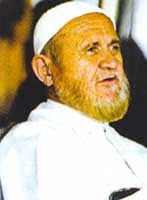
This Evil man who said:
"the dome over the Prophets grave should be destroyed"!
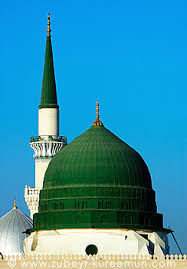
--
Evil al Albani demanded in four or five of his books that the Noble Grave be brought out of the Mosque in Madina and its Green Dome destroyed.
He states: “I have found no evidence for the Prophet’s – Allah bless and greet him – hearing of the salaam of those who greet him at his grave” and “I do not know from where Ibn Taymiyya took his claim: In Majmu`a al-Fatawa (27:384).
That he – Allah bless and greet him – hears the salaam from someone near.” This and the previous item are among his greater enormities and bear the unmistakable signature of innovation and deviation.
In his notes on Nu`man al-Alusi’s al-Ayat al-Bayyinat (p. 80) and his Silsila Da`ifa (#203).
Evil Collaborators
Muqbil ibn Hadi al-Wadi`i who asked that the Noble Grave be brought out of the Mosque and the Green Dome destroyed
Muqbil ibn Hadi al-Wadi‘i – known through his books and tapes for his propensity to insult and disparage those of the Ulema who disagree with him, those who call unto Allah, and the pious of this Community of Islam – to produce some research at the end of his studies at the Islamic University of Madîna titled “About the Dome Built over the Grave of the Messenger ” sponsored by Shaykh Hammad al-Ansarî.
In this paper he demands openly and without shame that the Noble Grave be brought out of the Mosque, deems the presence of the Grave and Noble Dome there major innovations, and asks that they both be destroyed! On top of this you granted him high marks and a passing grade!
--
"It is not permitted to glorify buildings and historical sites," proclaimed Sheikh Abdulaziz bin Baz, then the kingdom's highest religious authority, in a much-publicized fatwa in 1994.
"Such action would lead to polytheism. ... [S]o it is necessary to reject such acts and to warn others away from them."
* A pamphlet published by the Ministry of Islamic Affairs, endorsed by Abdulaziz Al Sheikh, the Grand Mufti of Saudi Arabia, and distributed at the Prophet's Mosque, where Mohammed, Abu Bakr, and the Islamic Caliph Umar ibn Al Khattab are buried, reads,
"The green dome shall be demolished and the three graves flattened in the Prophet's Mosque," according to Irfan Al Alawi, executive director of the London-based Islamic Heritage Research Foundation.
This shocking sentiment was echoed in a speech by the late Muhammad ibn Al Uthaymeen, one of Saudi Arabia's most prominent Wahhabi clerics, who delivered sermons in Mecca's Grand Mosque for over 35 years: "We hope one day we'll be able to destroy the green dome of the Prophet Mohammed," he said, in a recording provided by Al Alawi.
---
ADVICE To Our Brothers the Scholars ofNajd
[1420/1999]
Sayyid Yusuf ibn Al-Sayyid Hashim al-Rifa'i
20. Aiding the Arch-Innovator, al-Albani
You have provided a haven to Nasir Albani 21 and abetted him, allowing him to publish his book Ahkam al-Jana'iz wa Bida'uha in which he openly asks for the removal of the grave of the Prophet, peace and greetings be upon him, from the most noble Mosque! 22
You appointed him a member in the upper board of the Islamic University in Madina al-Munawwara and a teacher in it. After the late King Faysal barred him and expelled him from the country with some of his followers you returned him to that position.
You still liberally propagate and recommend his deviantbooks but have interdicted and forbidden some of the books of Hujjat al-Islam al- Ghazzali, Abu al-Hasan al-Nadwi, 'Abd al-Fattah Abu Ghudda, al-Maliki, Sa'id Hawwa, al-Buti and others of the Ulema of the Muslims. Where is justice and equity?
--------------------------
21 When he was banned from Syria before his expulsion fromSaudi Arabia. He lived house arrest in Amman until his death in 1999. Cf. Appendix,"Albani&co." [T].
22 He reiterates this foolishness in his Tahdhir al-Sajid,Hijjat al-Nabi, and Manasik al-Hajj wa al-'Umra.[T]
---------------
But, hold on... he wrote a 'Will' to preserve his own grave?

Al-Albani wrote in his wasiyya (will):
" I ask that the graveyard (for my burial) be an old one, to ensure that its graves will not be exhumed (leveled to the ground)".
(Ma'a Shaykhinaa Naasiris-Sunnah wad-Deen - pages 27-31).
--
Similarly, when the Sufi cemetery was razed by Syrian Salafis to make way for the University of Damascus and its campus in that city, King Abd al-Aziz Ibn Sa`ud of Saudi Arabia intervened personally, on the advise of Wahhabi clergy, to preserve intact the graves and tombs of Ibn Taymiyya and his student Ibn Kathir.

---
""To add more insult to the wounds of humiliation ofProphet (صلى الله عليه و آله وسلم) Salafis built a Public Toilet on his house in Makka where he lived and prayed with his family for 28 years. Millions of people are made to shit, urinate and spit on this sacred place, 24 hours of the day. When Prophet(صلى الله عليه و آله وسلم) migrated to Makka, Paagans did not destroy his house and built a public toilet on it.
This kind of torture and humiliation was not done even by Makkan Mushrikeen.
...for the full article and further reading visit : Here
---
" The Ijazas "

The Ijazas of bin Baz & al-Albani
A self proclaimed Scholar:

-
Quote, Wahabi/Salafi:
"Shaykh Al-Albani has Ijaza in hadith from the late Allamah Shaykh Muhammad Raghib at-Tabaagh with whom he studied hadith sciences, gaining authority to transmit from him. The Shaykh himself refers to this Ijaza in Mukhtasar al-Uluw (p.72) and in Tahdir as-Sajid (p.63). He has a further Ijaza from Shaykh Bahjatul Baitaa (through whom his isnad stretches back to Imam Ahmad). These are mentioned in the book Hayat Al-Albani (the Life of Al-Albani) by Muhammad ash- Shaibaani. This sort of Ijaza is given only to those who have excelled in hadith and can be trusted to accurately convey a hadith. A copy of the Ijaza is in the possession of his student, Ali Hassan al-Halabi. So it is not correct to say that the Shaykh is self- taught from books, without authority and without Ijaza."
[end of quote]
Answer/Response:
Muhammad Raghib al-Tabbakh (1293-1370) had many Shaykhs,among them al-Nabhani and some of the other Shuyukh of Sayyid Muhammad ibn `Alawi, and was a great Hanafi historian and `alim of hadith with whom Abu Ghudda read, among other things, al-Qari's al-Asrar al-Marfu`a, but
Abu Ghudda said Tabbakh raised Ibn Taymiyya almost to the rank of a prophet.
There are three reasons why this ijaza fails to prove anything new about Albani:
1. Albani only had ijaza from Tabbakh and no one else to my knowledge.
2. Albani calls Tabbakh "Shaykhi fil-ijaza" which means he did not read anything with him.
3. Albani was known to denigrate the ijaza system as "worthless in our times," which automatically makes any ijaza he might have invalid.
Hence, this entire aspect of his life definitely fits his profile as "self-taught from books."
Muhammad Bahjat al-Baytar (1311-1396) was Albani's friendand taught `aqida in Saudi Arabia for years but in Syria he was asked only to teach Tafsir and hadith.
Both Tabbakh and Baytar were run-of-the-mill Wahhabis.
The remark "through whom his isnad stretches back to Imam Ahmad" shows ignorance of isnad on the part of the speaker as [1] the same can be said of all possessors of isnad, so it does not confer any particular distinction; and [2] the greatness of isnad is the fact that it rises back up to the Prophet, upon him blessings and peace, not just the Successors of the Successors.
Sources consulted:
Albani, Mukhtasar al-`Uluw (p. 72). Al-Hafiz, Muti`. Tarikh Ulama' Dimashq fil-Qarn al-Rabi` Ashar (2:918- 925) [on Baytar]. Rashid, Muhammad `Abd Allah. Imdad al-Fattah (p. 307-312) [on Tabbakh].
---
Sheikh Nuh comments on this here:
Our teacher in hadith, Sheikh Shu‘ayb al-Arna’ut, tells my wife and me that Sheikh Nasir al-Albani learned his hadith knowledge from books and manuscripts in the Dhahiriyya Library in Damascus, as well as his long years working on books of hadith.
He did not get any significant share of his knowledge from living hadith scholars, according to Sheikh Shu‘ayb, for the very good reason that there wasn’t anyone in Damascus at the time who knew much about hadith, and he didn’t travel anywhere else to learn. I have heard Salafis say that he has an ijaza from one person in Syria, but it could only be (according to Sheikh Shu‘ayb) from someone with far less knowledge than himself
I believe Sheikh Shu‘ayb about this, because his family, like Sheikh Nasir’s, were of the Albanians who emmigrated to Damascus at the collapse of the Ottoman Empire, and they all know each other rather intimately.
The impression one gets is that Sheikh Nasir’s father, Sheikh Nuh al-Albani, was so strict a Hanafi that he produced something of an over-reaction in Sheikh Nasir not only against Abu Hanifa and his madhhab, but against traditional Islamic sheikhs as well.
According to Sheikh Shu‘ayb, Sheikh Nasir studied tajwid or ‘Qur’anic recitation’ and perhaps the Hanafi fiqh primer Maraqi al-falah [The ascents to success] with his father Sheikh Nuh al-Albani, and possibly other lessons in Hanafi fiqh from Sheikh Muhammad Sa‘id al-Burhani, who taught in Tawba Mosque, in the quarter of the Turks on the side of Mount Qasiyun, near Sheikh Nasir’s father’s shop.
Sheikh Nasir subsequently found that his time could be more profitably spent with books and manuscripts at the Dhahiriyya Library and in reading works to students, and he did not attend anyone else’s lessons
As for his ijaza or ‘warrant of learning,’ Sheikh Shu‘ayb tells us that it came when a hadith scholar from Aleppo, Sheikh Raghib al-Tabbakh, was visiting the Dhahiriyya Library in Damascus, and Sheikh Nasir was pointed out to him as a promising student of hadith.
They met and spoke, the sheikh authorized him "in all the chains of transmission that I have been authorized to relate"—that is to say, a general ijaza, though Sheikh Nasir did not attend the lessons of the sheikh or read books of hadith with him.
Sheikh Raghib al-Tabbakh had chains of sheikhs reaching back to the main hadith works, such as Sahih al-Bukhari, the Sunan of Abu Dawud, and hence had a contiguous chain back to the Prophet (Allah bless him and give him peace) for these books. But this was an authorization (ijaza) of tabarruk, or ‘for the blessing of it,’ not a ‘warrant of learning’—for Sheikh Nasir did not go to Aleppo to learn from him, and he did not come to Damascus to teach him
This type of authorization (ijaza), that of tabarruk, is a practice of some traditional scholars: to give an authorization in order to encourage a student whom they have met and like, whom they find knowledgeable, or hope will become a scholar. The reason I know of such ijazas is because I have one, from the Meccan hadith scholar Sheikh Muhammad ‘Alawi al-Maliki, which authorizes me to relate "all the chains of transmission that I [Muhammad ‘Alawi al-Maliki] have been authorized to relate by my sheikhs," including chains of transmission reaching back to the hadith Imams Malik, al-Bukhari, Muslim, Abu Dawud, al-Tirmidhi, al-Nasa’i, Ibn Majah (Mecca: Muhammad ‘Alawi al-Maliki, 1412/1992).
Though my name is on the authorization, and it is signed by the sheikh, it does not make me a hadith scholar like he is, because aside from some of his public lessons, my hadith knowledge is not from him but from Sheikh Shu‘ayb, whom I have actually studied with. Rather, Sheikh al-Maliki knows my sheikhs in Damascus, that I am the translator of ‘Umdat al-salik [Reliance of the traveller] in Shafi‘i fiqh, that we have known each other for some time, and he approves of my way. The scholarly value of such ijazas is merely to establish that we have met.
Would you be so kind as to telling us who Al Albanis Sheikh Was?
As far As I know Al Albanis Sheikh was the Damascus library.
Now If I spent my days at my local library studying anatomy and surgical techniques would you let me do surgery on you?
This is because you don’t trust my expertise and by allowing me to perform surgery on you, you might die.
As A Muslim I hope you would say that your deen is more valubel than your life, so why would you take your deen from a man who is self taught, but you wouldnt get operated on by a man who is self taught?
Now you justify his lack of formal education in the field of hadeeth by saying that his work was checked and verifyed by such schoalrs as Bin Baz - but I dont know of Bin Bazs Ijaza either - and Bin Bazs level of scholarly work contradicts the majority of Ulema throughout history.
Al Bani demonstrated that he was self taught by making over 1200 forgivable mistakes, which are only forgivable if he himself admits and corrects his mistakes by repenting in front of the People of Knowledge, as well as the sincere believers who may have been relying on his 'classifications of Hadith'.
There are a total of 852 ahadeeth that Alabni classsified as Sahih in one book and then contradicted himself in another classifying them as daeef. He also made many errors in the biographies of many of the transmitters. All perfectly common mistakes made by a person who is an amateur muhadeeth.
However, one of the more lofty mistakes made by Albani over his life time was the practice of showing a narrator "trustworthy" when Alabani wanted to prove something, and then magicly becomes "untrustworthy" when Albani is arguing against someone.
The salafis have places Albani on the same level as the best muhadeeth in history - but can you find even 10 mistakes like Albanis from that of Abu Hanifah, Malik, Shafi'i, Ibn Hanbal, Bukhari, Muslim, Abu Dawood, Tirmidhi, Ibn Maja, al-Nasai, Daraqutni, Hakim, Asqalani and so on . . . . Allah's mercy be upon them.
Al Albani himself places himself on much more lofty station - that above the Imam Bukhari and Imam Muslim (RA) by taking many of the hadeeths they clssified as Sahih and re-calssifying them as Daeef with the presumption that Albani, with his years in the damascus library, knew better then them. Here is one example of such a bold claim:
SELECTED TRANSLATIONS FROM VOLUME 1
No. 1: (*Pg. 10 No.1)
Hadith: The Prophet (Peace and blessings be upon him) said: "Allah says I will be an opponent to 3 persons on the day of resurrection: (a) One who makes a covenant in my Name but he proves treacherous, (b) One who sells a free person (as a slave) and eats the price (c) And one who employs a laborer and gets the full work done by him, but doesn't pay him his wages." [Bukhari no 2114-Arabic version, or see the English version 3/430 pg 236].
No. 1: (*Pg. 10 No.1)
Hadith: The Prophet (Peace and blessings be upon him) said: "Allah says I will be an opponent to 3 persons on the day of resurrection: (a) One who makes a covenant in my Name but he proves treacherous, (b) One who sells a free person (as a slave) and eats the price (c) And one who employs a laborer and gets the full work done by him, but doesn't pay him his wages." [Bukhari no 2114-Arabic version, or see the English version 3/430 pg 236].
Al-Albani said that this Hadith was DAEEF in "Daeef al-Jami wa Ziyadatuh, 4/111 No.4054".
Little does he know that this Hadith has been narrated by Ahmad and Bukhari from Abu Hurayra (Allah be pleased with him)!!
--
---
"Praise Albani"
Quote:
Wahhabi says: [...]
brother abylayl it is very simple to understand,
Let us say Nasir al-Din Albani now referred as (Mr "X") did not use computer like some modern day ijaza scholars use to analyze hadith chains.
- Mr. X analyzed 20,000 hadiths
- Mr. X was right in his analysis for 15,000 hadiths
- Mr. X was wrong on 5000 hadiths
So, blow up out of proportion those 5000 mistakes and make him boogeyman.
---
It is immensely troubling and their attitudes towards Hadith by Salafi/Wahhabi sect, they seem to openly reject Hadith from Bukhari and then there is the issue of Ibn Taymiyyah their "imam" rejecting the famous Hadith of Bukhari ‘There was Allah and nothing else besides him’ (Bukhari 3091)…and so many other Hadith and not to forget the same stance of al-Albani weakening/rejecting sound Hadith at will...
Wahhabi forgets that al-Albani was considered by his fellow admirers as "sheikh ul hadith" and a "Mujaddid"
Now this Wahhabi need's to look at this from a different point/angle, when giving examples of Mr "X,Y and Z" in regards to Scholars, Experts/Professionals and specially al-Albani as a "Hadith Specialist"
I don't think any other person in any other professional field/subject, can seriously get away by making numerous blunders errors/mistakes?
Let's refer to al-Albani " Mr.X " as A Surgeon:
-Mr. X operated on 20,000 patients!
-Mr. X was successful in operating on 15,000 patients.
-Mr. X was neglectful,wrong made mistakes/error's on 5000 patients which died.
So, now you may blow up as much as you want out of proportion 5-10-50 or even 5000 patients and just for argument sake say only "one" patient died due to the surgeons own error/mistake!
Now consider that this "one" was your own relative say your Mother or your Father , which were killed by the surgeons own mistake...!
Would this surgeon still have the certificate to practice his profession?
What would you say to The Surgeon?
Would you say:
It's OK! it was only a Mistake!
Just a " Boogeyman" ?
Al-Albaani was in charge of the teaching of the subject of Mustalalhahul Hadeeth (the science of Hadeeth) for three years at the Islamic University of Madinah in Saudi Arabia.

And these are some of misadventures of He published “corrected” editions of the two Sahihs of al-Bukhari and Muslim,which he deceitfully called “Abridgments” (mukhtasar)

in violation of the integrity of these mother books.
He published newly-styled editions of the Four Sunan, al-Bukhari’s al-Adab al-Mufrad, al-Mundhiri’s al-Targhib wa al-Tarhib, and al-Suyuti’s al-Jami` al-Saghir, each of which he split into two works, respectively prefixed Sahih and Da`if in violation of the integrity of these motherbooks.

^Albani compares Hanafi fiqh to the Gospel. Source: In his commentary 18- on al-Mundhiri's Mukhtasar Sahih Muslim, 3rd ed. (Beirut: al-Maktab al-Islami, 1977, p. 548). This phrase was removed from later editions.
Albani said: "Many of those who interpret figuratively [the Divine Attributes] are not heretics (zanâdiqa), but they say what heretics say," and "figurative interpretation is the very same as nullification (al-ta'wîl `ayn al-ta`tîl)."(1)
Albani suggests that al-Bukhari is a disbeliever for interpreting the Divine Face as dominion or sovereignty (mulk) in the verse"Everything will perish save His countenance" (28:88) in the book of Tafsir in his Sahih: "Except His wajh means except His mulk, and it is also said: Except whatever was for the sake of His countenance."
Albani blurts out: "No true believer would say such a thing" and "We should consider al-Bukhari innocent of that statement."(2)
---
(1) Fatawa (p. 522-523) and Mukhtasar al-`Uluw (p. 23f.).
(2) Fatawa (p. 523).
(2) Fatawa (p. 523).
---
al-Albani removed 83 chapters and 329 Ahadith from one single Hadith book, Adab Al-Mufred, written by Imam Bukhari. He did the same thing with many other important Ahadith books.
Imam Bukhari and his works are accepted by entire Muslim Ummah as most authentic, after Quran. He is the undisputed Imam in Hadith Narration.
Can any Muslim in the world believe that Imam Bukhari will write 83 spurious and concocted Hadith Chapters in his book?
To declare Imam Bukhari to have included 83 Chapters of wrong Ahadith means, Albani has branded Imam Bukhari as totally untrustworthy and unworthy to be a Hadith scholar,let alone be an Imam of Hadith (استغفر اللہ).
He declared Imam Bukhari as ‘Mushrik’ (Nauzubillahi) for translating ‘Wajhu’ as ‘dominion and sovereignty (mulk) in verse كُلُّ شَيْءٍ هَالِكٌإِلَّا وَجْهَهُ ۚ (Meaning – Everything will perish save His countenance (Al-Qasas – 88) in the ‘Book of Tafsir in Sahih Bukhari.
He wrote : “No true believer would say such a thing” and “We should consider Bukhari innocent of that statement”. (Look how intelligently he is branding Imam Bukhari as Mushrik (Astghfiruallah ). Reference – (Introduction to al-San’ani’s Raf al-Astar – page 24-25).
He declared Imam Bukhari as ‘Mushrik’ (Nauzubillahi) for translating ‘Wajhu’ as ‘dominion and sovereignty (mulk) in verse كُلُّ شَيْءٍ هَالِكٌإِلَّا وَجْهَهُ ۚ (Meaning – Everything will perish save His countenance (Al-Qasas – 88) in the ‘Book of Tafsir in Sahih Bukhari.
He wrote : “No true believer would say such a thing” and “We should consider Bukhari innocent of that statement”. (Look how intelligently he is branding Imam Bukhari as Mushrik (Astghfiruallah ). Reference – (Introduction to al-San’ani’s Raf al-Astar – page 24-25).
---
These questions just baffle the Innocent unsuspecting Muslims for answers from the Wahhabi Salafi Saudi Governament
who’s faith this evil scholar has robbed

by preaching them
THEIR fancy lies and error filled views about SAHI HADITH .

of
Mu-hammed [Nasir] Al-Albani
video
-------------------
also see this article as well that contains the download to Shaykh Mamduh’s refutation of al-Albani on this issue.
Fatwa of self- proclaimed Muhadith called
Nasir ud-din Albani:
وذكر الألباني في كتابه "حجة النبي صَلَّى اللَّهُ عَلَيْهِ وَسَلَّمَ" (ص185) أن من بدع زيارة المدينة النبوية "التزام زوار المدينة الإقامة فيها أسبوعا حتى يتمكنوا من الصلاة في المسجد النبوي أربعين صلاة ، لتكتب لهم براءة من النفاق وبراءة من النار
Translation: Albani mentioned in his book "Hujjat al-Nabi (Peace be upon him) Page # 185: it is an innovation (bid’ah) to visit Madeenah and tell the visitors to Madeenah to stay there for a week so that they will be able to offer forty prayers in the Prophet’s Mosque so that they will be free from hypocrisy and saved from the Fire.".
[Fatawa al Islam (1/3480) given by Wahabi Sheikh Salih al-Munajjad of islam-qa.com website, Online Question # 34752]
Actually the hadith of 40 prayers in Masjid an-Nabwi is authentic and it is Dajl/lie of Albani to call it weak.
None of the classical Muhaditheen called this report as weak rather they called it "SAHIH/HASAN"
عن أنس بن مالك ، عن النبي صلى الله عليه وسلّم قال: «مَنْ صَلَّى في مَسْجِدِي أَرْبَعينَ صَلاةً لا تَفُوْتُهُ صَلاةٌ كَتَبَ له بَرَاءَةً مِنَ النَّارِ وَبَرَاءَةً مِنَ العَذَابِ، وَبَرِىءَ مِنَ النِّفَاقِ».
قلت: روى الترمذي بعضه.
رواه أحمد والطبراني في الأوسط ورجاله ثقات.
Translation: Narrated by Anas bin Malik (ra) that the Prophet (Peace be upon him) said: Anyone who prays 40 prayers in my Mosque without missing a single one, then for him is freedom from hell fire, freedom from torment and freedom from Nifaaq
Imam al-Haythami said: Some part of it is narrated in Tirmidhi. This one is narrated by Imam Ahmed, Tabarani in his al-Awsat and the Rijaal of it are “(ALL) THIQA” [Majma az-Zawaid 3/667, Hadith # 5878]
Imam al-Mundhiri (rah) said in his Targheeb wa Tarheeb:
رواه أحمد، ورواته رواة الصحيح،
Translation: It is narrated by Ahmed and It is amongst Sahih narrations [Targheeb wa Tarheeb 2/139]
---
Sayyiduna Ziyad Ibn Hudair رضي الله عنه reported that Ameer ul-Mu’mineen Sayyiduna Umar ibn al-Khattab رضي الله عنه said; "Do you know what can destroy Islam? I said; "No" Sayyiduna Umarرضي الله عنه Said; ''It is destroyed by the errors of scholars, the argument of the hypocrites about the Book Of Allah and opinions of the misguided leaders." [Mishkaat]
--
"Umar (Allah be pleased with him) said to me: Do you know what can destroy Islam?"
I said: "No." He said: "It is destroyed by the mistakes of scholars, the argument of the hypocrites about the book (of Allah), and the opinions of the misguided leaders." (Mishkatul Masabih, 1/269, Trans. A.H. Siddiqui)
--
Ibrahim ibn Maisara reported Allahs Messenger (Peace be upon him) as saying:
"He who showed respect to an innovator he in fact aided in the demolishing of Islam." (Bayhaqi - see Mishkatul Masabih, 1/189, English Ed.)
---





.jpg)




